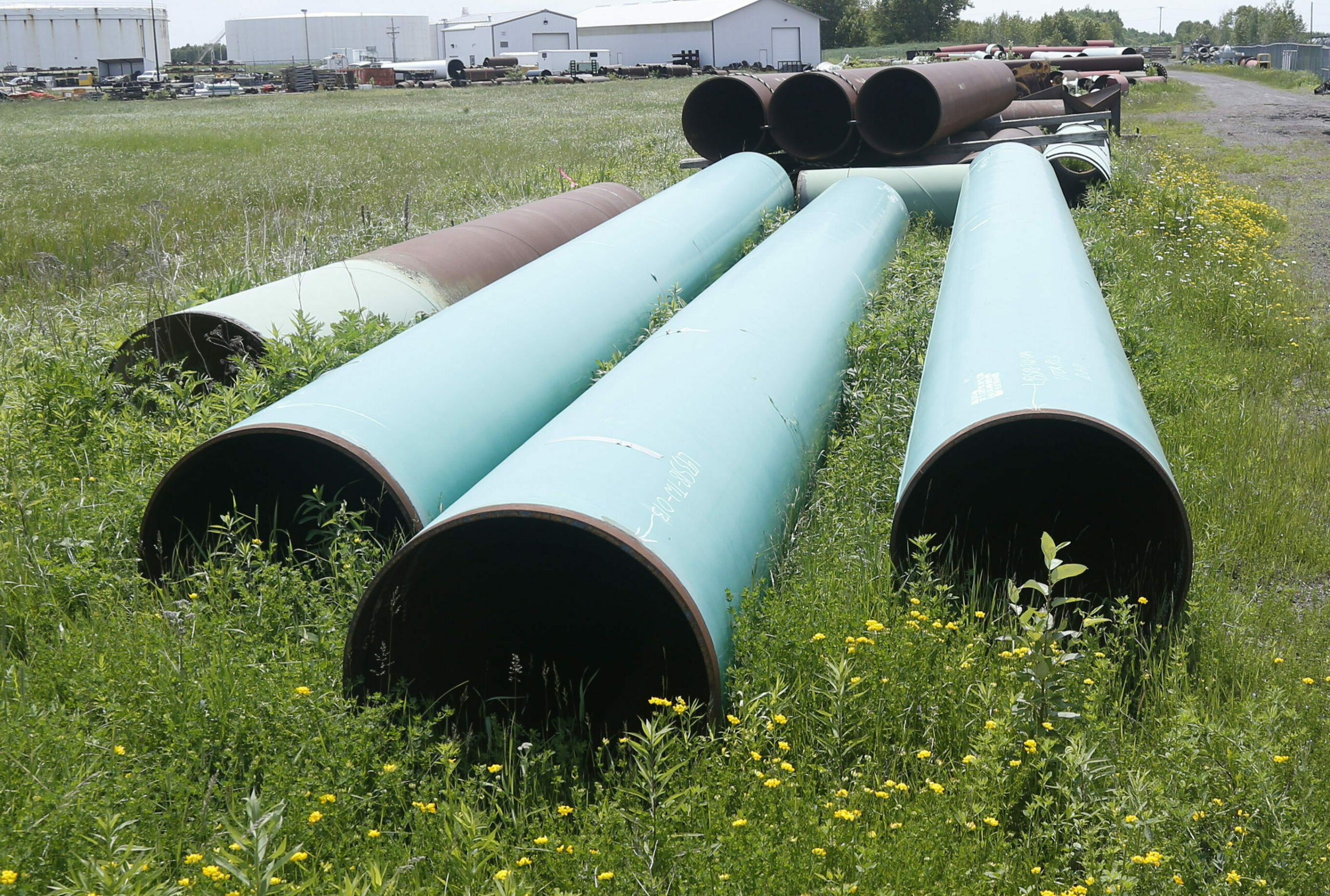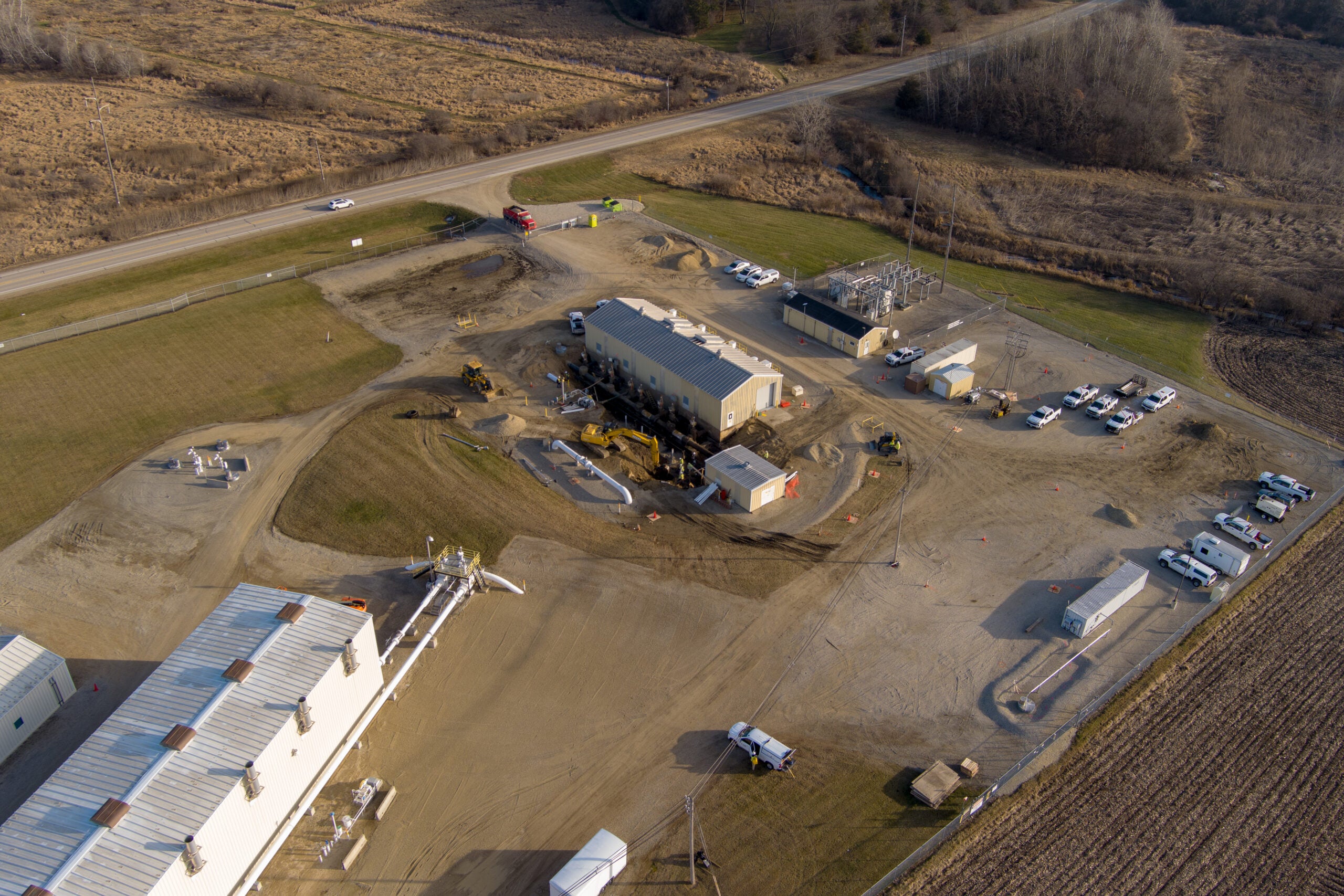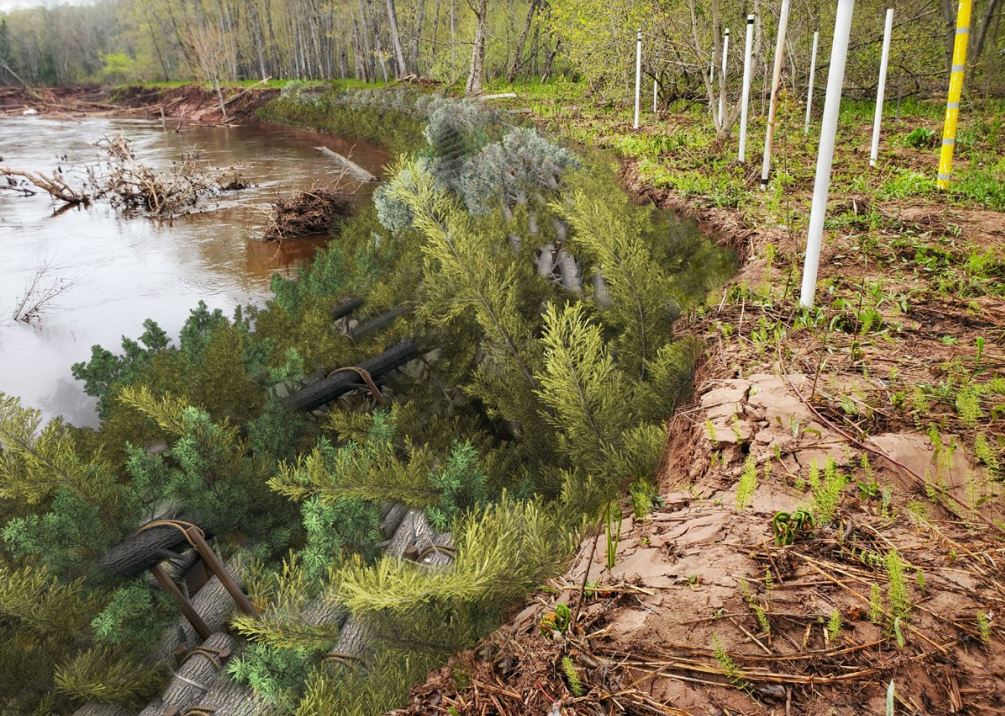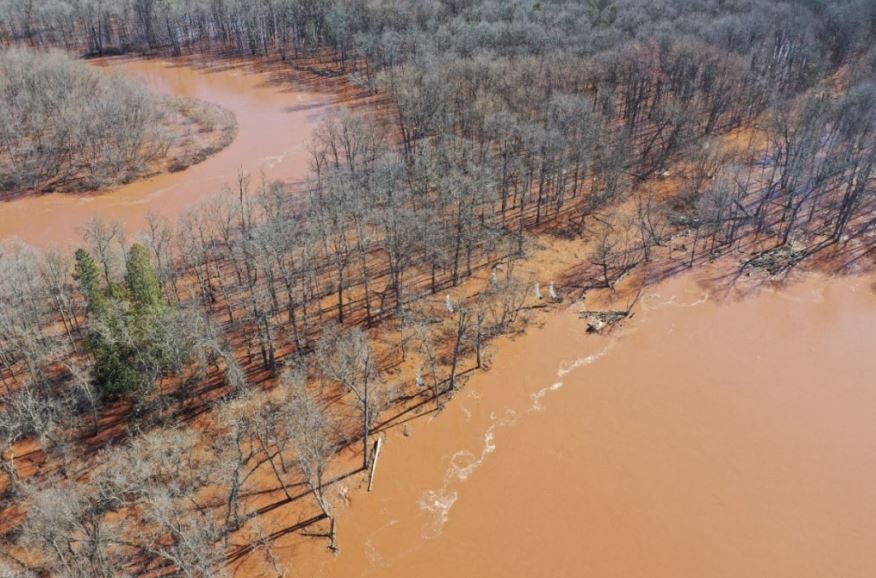Nearly 300 people attended a 10-hour-long virtual public hearing Wednesday about a draft environmental review for a $450 million plan to reroute an oil and gas pipeline across northern Wisconsin.
In December, the Wisconsin Department of Natural Resources released its draft environmental impact statement for a roughly 40-mile reroute of Enbridge’s Line 5 in Ashland and Iron counties. The pipeline carries up to 23 million gallons of oil and natural gas liquids per day and spans 645 miles from Superior to Sarnia, Ontario.
Enbridge wants to move the pipeline after the Bad River Band of Lake Superior Chippewa sued the company in 2019 to shut down and remove Line 5 from the tribe’s reservation.
Stay informed on the latest news
Sign up for WPR’s email newsletter.
The company’s new 30-inch line is expected to cross nearly 200 waterbodies and temporarily affect 135 acres of wetlands. Enbridge maintains the nearly 70-year-old pipeline serves as a vital link to fuel across the region.
[[{“fid”:”1101671″,”view_mode”:”embed_portrait”,”fields”:{“format”:”embed_portrait”,”alignment”:”right”,”field_image_caption[und][0][value]”:”%3Cp%3ETom%20Tiffany%20speaks%20at%20a%20campaign%20event%20in%20Rothschild%2C%20Wisconsin%2C%20on%20Thursday%2C%20December%2019%2C%202019.%20%3Cem%3ERob%20Mentzer%2FWPR%3C%2Fem%3E%3C%2Fp%3E%0A”,”field_image_caption[und][0][format]”:”full_html”,”field_file_image_alt_text[und][0][value]”:”Tom Tiffany speaks at a campaign event “,”field_file_image_title_text[und][0][value]”:”Tom Tiffany speaks at a campaign event “},”type”:”media”,”field_deltas”:{“2”:{“format”:”embed_portrait”,”alignment”:”right”,”field_image_caption[und][0][value]”:”%3Cp%3ETom%20Tiffany%20speaks%20at%20a%20campaign%20event%20in%20Rothschild%2C%20Wisconsin%2C%20on%20Thursday%2C%20December%2019%2C%202019.%20%3Cem%3ERob%20Mentzer%2FWPR%3C%2Fem%3E%3C%2Fp%3E%0A”,”field_image_caption[und][0][format]”:”full_html”,”field_file_image_alt_text[und][0][value]”:”Tom Tiffany speaks at a campaign event “,”field_file_image_title_text[und][0][value]”:”Tom Tiffany speaks at a campaign event “}},”link_text”:false,”attributes”:{“alt”:”Tom Tiffany speaks at a campaign event “,”title”:”Tom Tiffany speaks at a campaign event “,”class”:”media-element file-embed-portrait media-wysiwyg-align-right”,”data-delta”:”2″}}]]
Most people spoke in opposition to the reroute during a hearing that stretched into the early morning hours Thursday. Supporters of the project — including Republican lawmakers, labor unions and the state’s largest business lobby — touted the 700 construction jobs that would be created during the project. They also highlighted the $135 million economic impact it would create for the state, as well as the $36.5 million in property tax revenues that the company’s pipelines generate.
Craig Summerfield, director of environmental and energy policy for Wisconsin Manufacturers and Commerce, spoke on behalf of the business lobbying group.
“The continued consistent supply of energy products along Line 5 is critical to Wisconsin businesses,” Summerfield said. “This energy fuels our businesses, heats our homes, and it’s imperative that the permit be granted so that this vital source of energy can remain operating.”
Republican U.S. House Rep. Tom Tiffany, who represents the state’s 7th Congressional District where the line would be built, said everything about the project is a “win-win.”
“A new line will give us better technology and make it even safer,” Tiffany said.
Tiffany said Enbridge’s proposed reroute also honors a request by the Bad River tribe to remove the pipeline from tribal lands. Bad River Tribal Chairman Mike Wiggins Jr., rejected that notion.
“The only thing we have ever asked the oil company is to get out of our water,” Wiggins said. “That has been rejected, that has been disrespected and essentially ignored.”
[[{“fid”:”1090561″,”view_mode”:”embed_portrait”,”fields”:{“format”:”embed_portrait”,”alignment”:”right”,”field_image_caption[und][0][value]”:”%3Cp%3EMike%20Wiggins%2C%20chairman%20of%20the%20Bad%20River%20Band%20of%20Lake%20Superior%20Chippewa%2C%20speaks%20during%20a%20public%20meeting%20at%20Northland%20College%20in%20Ashland%2C%20Wis.%2C%20on%20Sept.%2025%2C%202019.%20His%20community%20considers%20the%20wolf%20a%20brother.%26nbsp%3B%3Cem%3EDanielle%20Kaeding%2FWPR%3C%2Fem%3E%3C%2Fp%3E%0A”,”field_image_caption[und][0][format]”:”full_html”,”field_file_image_alt_text[und][0][value]”:”Mike Wiggins, chairman of the Bad River Band of Lake Superior Chippewa”,”field_file_image_title_text[und][0][value]”:”Mike Wiggins, chairman of the Bad River Band of Lake Superior Chippewa”},”type”:”media”,”field_deltas”:{“1”:{“format”:”embed_portrait”,”alignment”:”right”,”field_image_caption[und][0][value]”:”%3Cp%3EMike%20Wiggins%2C%20chairman%20of%20the%20Bad%20River%20Band%20of%20Lake%20Superior%20Chippewa%2C%20speaks%20during%20a%20public%20meeting%20at%20Northland%20College%20in%20Ashland%2C%20Wis.%2C%20on%20Sept.%2025%2C%202019.%20His%20community%20considers%20the%20wolf%20a%20brother.%26nbsp%3B%3Cem%3EDanielle%20Kaeding%2FWPR%3C%2Fem%3E%3C%2Fp%3E%0A”,”field_image_caption[und][0][format]”:”full_html”,”field_file_image_alt_text[und][0][value]”:”Mike Wiggins, chairman of the Bad River Band of Lake Superior Chippewa”,”field_file_image_title_text[und][0][value]”:”Mike Wiggins, chairman of the Bad River Band of Lake Superior Chippewa”}},”link_text”:false,”attributes”:{“alt”:”Mike Wiggins, chairman of the Bad River Band of Lake Superior Chippewa”,”title”:”Mike Wiggins, chairman of the Bad River Band of Lake Superior Chippewa”,”class”:”media-element file-embed-portrait media-wysiwyg-align-right”,”data-delta”:”1″}}]]
Environmental groups, tribal members, activists and residents from across the state, Midwest and beyond have argued the DNR’s draft environmental review is insufficient, lacks baseline data and doesn’t adequately evaluate impacts along the route that include the risk of spills.
“The draft (environmental impact statement) doesn’t properly recognize how harmful Enbridge’s proposal for a new Line 5 segment would be to Wisconsin’s waters, wetlands or climate,” Jennifer Giegerich, director of government affairs for Wisconsin Conservation Voters, said.
Mic Isham, executive administrator of the Great Lakes Indian Fish and Wildlife Commission, said the review failed to accurately characterize treaty rights in the project area.
“Tribal members depend on clean, healthy and abundant natural resources to meet their physical, social, cultural, economic and spiritual needs,” said Isham. “Activities that have the potential to threaten those resources must be the subject of careful and thorough scrutiny.”
Others raised concerns that the plans would increase the risk of human trafficking along the route as seen during the construction of Line 3 in Minnesota, including members of the Missing and Murdered Indigenous Women task force in Wisconsin.
Opponents also highlighted the line’s contribution to climate change as scientists urge drastic cuts in carbon emissions.
Anders Hanhan is an organizer for the Sunrise Movement in Appleton, which aims to bring urgency to addressing climate change and ending practices that are harmful to the earth. He said we need to move way from fossil fuel projects.
“We have eight years to reduce our carbon emissions to zero or else we will hit a catastrophic tipping point, which will send our world over the edge,” Hanhan said. “We don’t need a new fossil fuels project. There are already plenty of pipelines that run back and forth across the state that are owned by Enbridge.”
[[{“fid”:”1558746″,”view_mode”:”full_width”,”fields”:{“format”:”full_width”,”alignment”:”center”,”field_image_caption[und][0][value]”:”%3Cp%3EEnbridge%20is%26nbsp%3Breplacing%20its%201960s-era%20Line%203%20pipeline%20across%20northern%20Minnesota%2C%20amplifying%20protests%20in%20the%20region.%26nbsp%3B%3Cem%3EPhoto%20courtesy%20of%20Enbridge%3C%2Fem%3E%3C%2Fp%3E%0A”,”field_image_caption[und][0][format]”:”full_html”,”field_file_image_alt_text[und][0][value]”:”Enbridge Line 3″,”field_file_image_title_text[und][0][value]”:”Enbridge Line 3″},”type”:”media”,”field_deltas”:{“3”:{“format”:”full_width”,”alignment”:”center”,”field_image_caption[und][0][value]”:”%3Cp%3EEnbridge%20is%26nbsp%3Breplacing%20its%201960s-era%20Line%203%20pipeline%20across%20northern%20Minnesota%2C%20amplifying%20protests%20in%20the%20region.%26nbsp%3B%3Cem%3EPhoto%20courtesy%20of%20Enbridge%3C%2Fem%3E%3C%2Fp%3E%0A”,”field_image_caption[und][0][format]”:”full_html”,”field_file_image_alt_text[und][0][value]”:”Enbridge Line 3″,”field_file_image_title_text[und][0][value]”:”Enbridge Line 3″}},”link_text”:false,”attributes”:{“alt”:”Enbridge Line 3″,”title”:”Enbridge Line 3″,”class”:”media-element file-full-width media-wysiwyg-align-center”,”data-delta”:”3″}}]]
Trent Wetmore, operations director for Enbridge, said shutting down the line and offloading product to other pipelines is “not a simple task.”
“Those lines are simply full and cannot accept the additional capacity,” Wetmore said.
The project is expected to include blasting and drilling at 139 wetlands and waterways to install the pipeline. The review also identified federal and state endangered species around the project, as well as high-quality waterways and wetlands.
The Kakagon and Bad River Sloughs, which comprises 16,000 acres of internationally recognized wetlands, are home to the largest wild rice bed on the Great Lakes and is downstream of the project.
The DNR and its consultant found an oil spill to nearby surface waters like the Bad River would temporarily impair water quality for weeks to months.
[[{“fid”:”1015236″,”view_mode”:”full_width”,”fields”:{“format”:”full_width”,”alignment”:”center”,”field_image_caption[und][0][value]”:”%3Cp%3EThe%20Bad%20River%2C%20as%20seen%20running%20through%20northwestern%20Wisconsin’s%20Bad%20River%20Reservation.%26nbsp%3B%3Cem%3E%3Ca%20href%3D%22https%3A%2F%2Fwww.flickr.com%2Fphotos%2Fwidnr%2F6555576941%2Fin%2Fphotolist-aZi3CD-BAK9E-aFzbzn-noxyd%22%20rel%3D%22nofollow%20noopener%20noreferrer%22%20target%3D%22_blank%22%3EWisconsin%20DNR%3C%2Fa%3E%26nbsp%3B(CC-BY-ND%202.0)%3C%2Fem%3E%3C%2Fp%3E%0A”,”field_image_caption[und][0][format]”:”full_html”,”field_file_image_alt_text[und][0][value]”:”The Bad River, as seen running through northwestern Wisconsin’s Bad River Reservation.”,”field_file_image_title_text[und][0][value]”:”The Bad River, as seen running through northwestern Wisconsin’s Bad River Reservation.”},”type”:”media”,”field_deltas”:{“4”:{“format”:”full_width”,”alignment”:”center”,”field_image_caption[und][0][value]”:”%3Cp%3EThe%20Bad%20River%2C%20as%20seen%20running%20through%20northwestern%20Wisconsin’s%20Bad%20River%20Reservation.%26nbsp%3B%3Cem%3E%3Ca%20href%3D%22https%3A%2F%2Fwww.flickr.com%2Fphotos%2Fwidnr%2F6555576941%2Fin%2Fphotolist-aZi3CD-BAK9E-aFzbzn-noxyd%22%20rel%3D%22nofollow%20noopener%20noreferrer%22%20target%3D%22_blank%22%3EWisconsin%20DNR%3C%2Fa%3E%26nbsp%3B(CC-BY-ND%202.0)%3C%2Fem%3E%3C%2Fp%3E%0A”,”field_image_caption[und][0][format]”:”full_html”,”field_file_image_alt_text[und][0][value]”:”The Bad River, as seen running through northwestern Wisconsin’s Bad River Reservation.”,”field_file_image_title_text[und][0][value]”:”The Bad River, as seen running through northwestern Wisconsin’s Bad River Reservation.”}},”link_text”:false,”attributes”:{“alt”:”The Bad River, as seen running through northwestern Wisconsin’s Bad River Reservation.”,”title”:”The Bad River, as seen running through northwestern Wisconsin’s Bad River Reservation.”,”class”:”media-element file-full-width media-wysiwyg-align-center”,”data-delta”:”4″}}]]Enbridge was responsible for one of the nation’s largest inland oil spills in July 2010, which cost more than $1.2 billion to clean up. More recently, Minnesota regulators fined the company $3 million for failing to follow the state’s environmental laws after Enbridge pierced a groundwater aquifer during construction of Line 3, releasing at least 24 million gallons of water.
Line 5 has had around 30 spills that have released more than 1 million gallons of oil and natural gas liquids on land since 1968, according to federal pipeline safety data obtained by the National Wildlife Federation.
The DNR has received thousands of comments in support and opposition of issuing permits for the project.
Enbridge is currently fighting efforts by the state of Michigan to shut down Line 5 in the Great Lakes. The pipeline provides around 65 percent of the propane supplied to residents in Michigan’s Upper Peninsula and around 55 percent of the state’s propane fuel. Opponents of line’s relocation note very little of that fuel is used to heat homes or businesses in northern Wisconsin.
Enbridge must obtain permits from multiple state and federal agencies. The DNR is currently accepting public comment on the project through Friday, March 18.
The public hearing began at 4 p.m. and concluded around 2 a.m. on Thursday.
Wisconsin Public Radio, © Copyright 2025, Board of Regents of the University of Wisconsin System and Wisconsin Educational Communications Board.



